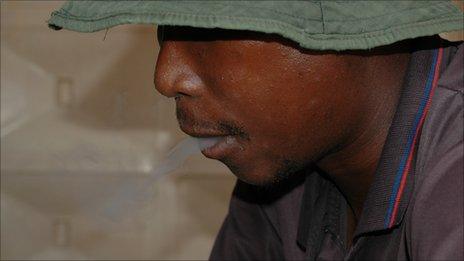'Whoonga' threat to South African HIV patients
- Published

Whoonga smoking is gaining in popularity in South Africa's townships
HIV patients in the South African township of Umlazi live in fear of being robbed of their live-saving anti-retroviral drugs.
They have become attractive targets for gangs who steal their pills, which are then combined with detergent powder and rat poison to make "whoonga" - a highly toxic and addictive street drug.
Smokers use it to lace joints, believing the anti-retroviral Stocrin increases the hallucinogenic effects of marijuana - though there is no scientific proof of this.
The threat to HIV patients in this poor community of KwaZulu-Natal province is very real.
"On the one hand, we are battling to stay alive," says 49-year-old Phumzile Sibiya, who has been taking ARV drugs for six months.
"Now we have to worry about thugs who will want to rob us for a chance to live because that's what they are stealing from us when they take our pills."
Ms Sibiya and other HIV patients now visit the clinic in a group to ensure their safety.
"I just don't feel safe at all when I come to collect my pills. You never know where they could be waiting for you. This is very painful," she says as she shuffles along a long queue at Ithembalabantu Clinic, south of Durban.
'Cravings'
The clinic is the biggest distributor of Aids drugs in this part of KwaZulu-Natal, the province with the highest number of HIV infections in the country.
Two recovering whoonga users talk about the drug and the effect it has had on their lives
About six million South Africans are infected with HIV and an estimated 700,000 of those are on life-prolonging ARV treatment.
South Africa's police chief Bheki Cele has described whoonga as "a big national concern" and said the force's elite Hawks unit was investigating its contribution to crime.
Dr Bright Mhlongo, who heads Ithembalabantu clinic, agrees that the growing popularity of whoonga is worrying.
"The use of Stocrin in whoonga will limit our already limited resources in terms of ARV treatment in Africa," he told the BBC.
"This pill is the backbone of our ARV treatment - it is what we use for most of our patients.
"If we lose it as a base drug we might be forced to use other drugs which are a lot more expensive and not as easily available."
Whoonga is cheap compared to other drugs on the streets - a single tablet costs 20 rand ($3; £1.70).
Recovering addict Vukani Mahlase, who is also an HIV patient, says users often need multiple hits in a day.
"When the cravings come and you don't have money you are prepared to do anything," he says.
"My friends and I would use guns and knives, anything at our disposal, all for a bit of money to buy the next hit."
He has just left prison after spending a year inside for robbing someone for drugs money and says he is determined to quit the habit.
"The doctors have warned me that if I continue smoking whoonga it could affect how well my body responds to my medication," he says.
Doctors say smoking whoonga poses severe health risks including internal bleeding, stomach ulcers and in some instances death.
'Friend died'
A whoonga smoker in his twenties, who did not want to give his name, says its high is a bitter-sweet experience.
"It is very addictive and you have to take it just to feel normal. When I'm craving a hit my joints ache and I have bad stomach cramps, it feels like your insides are on fire. I am forced to take it just so the pain can stop," he says of his three-year habit.
Many young men at Whoonga Free, a community project for recovering drug users in KwaDabeka township outside Durban, often blame peer pressure for their addiction.
"There are no jobs here and you end up getting involved in wrong things. Whoonga was the in-thing at the time so that's why I started smoking it, I wanted to fit in," says 21-year-old Thabane Chamane.
Siphesihle Pakisi, 19, agrees.
"I was struggling to deal with my parents' divorce at the time and my friends told me about this drug that made you forget all your problems. They said it made you stress-free and it seemed to work but only for a short while," he says.
He and his friends would spend up to 200 rand a day on whoonga but decided to quit when one of his friends died from an overdose.
"A friend of mine died right before my eyes last year. He threw up his intestines - it was really scary I didn't want that to happen to me," he says, staring into the distance.
Up until 2008, the government's ARV programme was limited because it felt the drugs were too expensive.
President Jacob Zuma's two-year-old administration has promised to roll them out more extensively, but it will have to make sure the drugs end up in the right hands.
Thokozani Sokhulu, who set up Whoonga Free in 2008, says he has dealt with hundreds of victims of the drug in that time.
"It is not enough to arrest the people who sell the drugs you need to offer its users an alternative way of living," he says.
"Our young people are crying out for help."
- Published1 November 2010
- Published29 October 2010